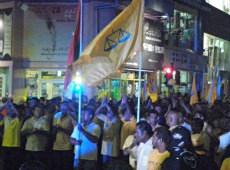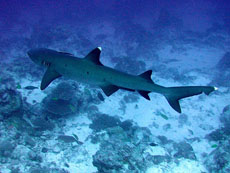This story was first published on the Maldives resort review site, Dhonisaurus.com.
South Ari Atoll is hosting a whale shark festival aiming to bring together local resorts and communities with a view to expanding cooperation on conservation – as well as providing tourists with insight into one of the country’s most elusive creatures.
Based on the island of Dhigurah, the festival is focused not only on trying to better understand the movement and behaviours of whale sharks in their natural habitat, but also to give visitors a chance to better understand South Ari Atoll’s ecology and culture.
Organisers have expressed hope that the festival will establish itself as an annual event in the country, having already secured sponsorship from a number of resorts including LUX* Maldives, Mirihi Island, Vilamendhoo, Holiday Island and the Conrad Maldives Rangali Island.
The event also represents a collaboration between local NGOs such as the Maldives Whale Shark Research Programme (MWSRP), the South Ari Marine Protected Area, the International Union for Conservation of Nature, as well as the Environmental Protection Agency (EPA).
Beyond the country’s traditional appeal as a destination for sun, sand and sea, sightings of creatures like the whale shark have increasingly proven a major draw for visitors in recent years.
In attempts to balance the potential environmental impacts of increased numbers of visitors wishing to experience the country’s delicate ecosystems, several island resort properties have announced collaborations with conservation groups and marine reserves across the country.
The Conrad Maldives Rangali Island resort told Dhonisaurus that beyond playing a role in today’s festival, the property over the last six years has been involved with efforts to promote better conservation and understanding of whale sharks in the country.
Resort spokesperson Katherine Anthony said the resort had been a main sponsor of the MWSRP NGO since 2007, as part of a strategy she said reflected the seriousness with which the property treated the conservation and study of the local environment.
Conrad has said that the nature of the resort’s sponsorship of the MWSRP is partly financial, but also provided accommodation, fuel and food to the group’s researchers for nine months of the year.
Besides research, the MWSRP also allows guests at the property to participate in three weekly excursions to go out and see the creatures.
“They can talk about whale sharks in depth and give a much more detailed and focused excursion than you’d find elsewhere due to the MWSRP’s in depth knowledge of whale sharks,” she said.
“What we have found is that already one guest has joined the MWSRP as a research volunteer, so it’s definitely a program that’s of interest to our guests.”
Anthony added that resort guests accepting an invite to the festival would be given a unique and rarely seen insight into the local environment.
“It’s also an excellent opportunity to see life on an inhabited Maldivian island, eat Maldivian food, meet Maldivians and talk to them about their lives,” she said.
Biosphere ambitions
On a national level, the Maldives government is moving ahead with plans to transform the Maldives into what it claims will be the world’s largest biosphere reserve by designating zones across the country that would earmark land use for specific purposes such as tourism development or conservation.
In approving the plan to transform the country into a “world renowned” marine reserve, members of the cabinet claim there has been a growing number of visitors to areas such as Baa Atoll after it became a protected area.
While some tourism industry figures have welcomed existing efforts to transformation areas such as Baa Atoll into bio-reserves, concerns have been raised about the efforts taken to manage such zones in balancing tourism interests with preserving local habitats.




 Reefs have been “heavily modified” over the past 30 years – due to the lack of “concurrent precautionary management” – as “resource exploitation has expanded to meet the demands of an increased human / tourist population,” the report added.
Reefs have been “heavily modified” over the past 30 years – due to the lack of “concurrent precautionary management” – as “resource exploitation has expanded to meet the demands of an increased human / tourist population,” the report added. inappropriate atoll development, sedimentation, and pollution were also identified as key threats.
inappropriate atoll development, sedimentation, and pollution were also identified as key threats.